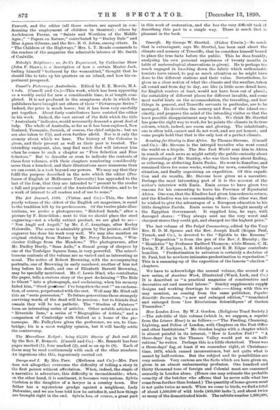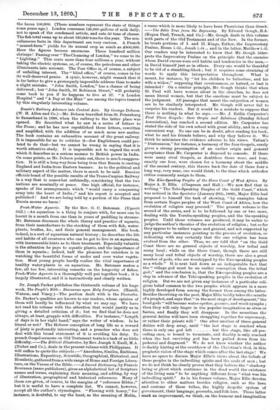How London Lives. By W. J. Gordon. (Religious Tract Society.)
—The sub-title of this volume (which is, we suppose, a reprint from the Leisure Hour) is as follows :—" The Feeding, Cleansing, Lighting, and Police of London, with Chapters on the Post Office and other Institutions." Mr. Gordon begins with a chapter which is almost painful in its interest, " How is London Fed ? " " A three-days' fog in the Thames Valley would put us on half- rations," he writes. Perhaps this is a little rhetorical There was a three-days' fog, at least if we remember right, at Christmas- time, 1879, which caused inconvenience, but not quite what is meant by half-rations. But the subject and its possibilities are very serious. Very curious are the facts which are here given us, given in an almost embarrassing profusion. One hundred and thirty thousand tons of foreign and Colonial meat are consumed annually in London alone. (Hence one may estimate the probable veracity of the butcher who affirms that he never sells what has come from further than Ireland.) The quantity of home-grown meat is not quite twice as much. When we come to birds, we find a total of about 1,500,000 of wild birds (400,000 larks !), and about twice as many of the domesticated kinds. The rabbits number 1,300,000,
the hares 100,000. (These numbers represent the state of things some years ago.) London consumes 125,000 gallons of milk daily, not to speak of the condensed article, and eats 50 tons of cheese. The fish total sums up to about 150,000 tons for the year. The mis- cellaneous facts in this department are very curious. A French ".mussel-farm" yields for its annual crop as much as .2400,000. Here the figures become enormous. Three hundred million shrimps ! Passing over " The Cleansing of London," we come to its "Lighting." This costs more than four millions a year, without taking the electric systems, or, of course, the petroleum and other illuminants into account. The Post Office is, of course, a subject of unfailing interest. The " blind office," of course, comes in for its well-deserved praise. A cynic, however, might remark that it is far better to give a grotesquely impossible address than to make a slight mistake. " John Smith, London," has a chance of being delivered;. but "John Smith, 36 Robinson Street," will probably come back to you if he happens to live at 37. " A London Hospital" and "A Day at the Mint" are among the topics treated by this singularly interesting volume.











































 Previous page
Previous page